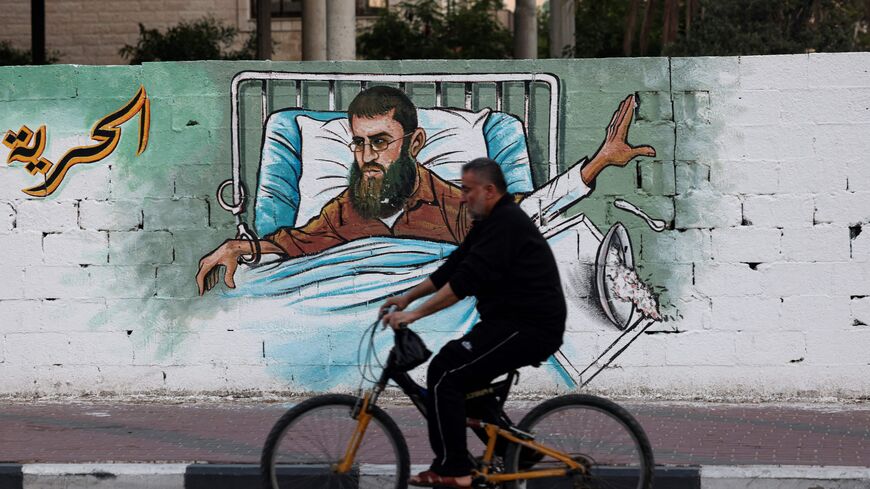Palestinian prisoner Khader Adnan, 45, died in Israeli custody on Tuesday after an 87-day hunger strike.
Adnan, a member of the Islamic Jihad, was found unconscious in his cell in the central Israeli Nitzan prison before dawn on Tuesday. He was transported to the Shamir Medical Center near Tel Aviv, but efforts to resuscitate him failed. He was declared dead at the hospital, said the Israel Prisons Service.
After the announcement of his death, a siren was heard at Kibbutz Sa’ad, near the border in the Gaza Strip. The Israeli army said that three rockets were fired from the Strip, all falling in open spaces and without any injuries. Israel fired at targets in Gaza in retaliation, the army said.
The Islamic Jihad movement issued a defiant statement on Tuesday. It read, “Our fight is continuing and the enemy will realize once again that its crimes will not pass without a response. Resistance will continue by all might and determination.”
The WAED Prisoners Association in Gaza told the Reuters that Khader Adnan was "executed in cold blood” and Palestinian Prime Minister Mohammed Shtayyeh called Adnan’s death “premeditated assassination.” The Palestinian Foreign Ministry blamed Israel for Adnan's death, saying it intends to approach the International Criminal Court and request an international inquiry into the incident.
A general strike was announced in the West Bank in protest of Adnan's death. Hundreds of people marched in his home town of Arrabeh near Jenin, carrying Palestinian flags and pictures of him.
According to Haaretz, the Israel Prisons Service is on alert in case of protests by Islamic Jihad and other Palestinian security prisoners, sending firefighting teams to various prisons. An unnamed official at the Israel Prisons Service was quoted as saying, "Islamic Jihad prisoners could act unexpectedly and violently. We are fully prepared operationally for any such development."
Adnan was last arrested on Feb. 5 as part of an Israeli security crackdown on Islamic Jihad infrastructure in Jenin, on suspicion of membership in the organization designated terrorist by Israel, and for incitement to violence. According to the Palestinian Prisoners Association, he had been detained by Israel 12 times and had spent around eight years in Israeli prisons in total, mostly under administrative detention without indictment or trial. Adnan was considered one of the Islamic Jihad's most senior activists in the West Bank, though he was primarily based in Gaza.
Adnan had gone on hunger strike several times while in Israeli detention. In 2012, Adnan refused to eat for 66 days. He ended his strike with a deal for his release. Back in prison in 2015, he again refused to eat for 55 days. He also refused any medical care and stopped his strike only when he was released. Immediately after his Feb. 5 arrest, he again went on hunger strike and refused to undergo medical checks or receive any medical treatment while incarcerated.
According to the Israeli human rights group HaMoked, Israel is currently holding around 1,000 Palestinian detainees without charge or trial, the highest number since 2003.








